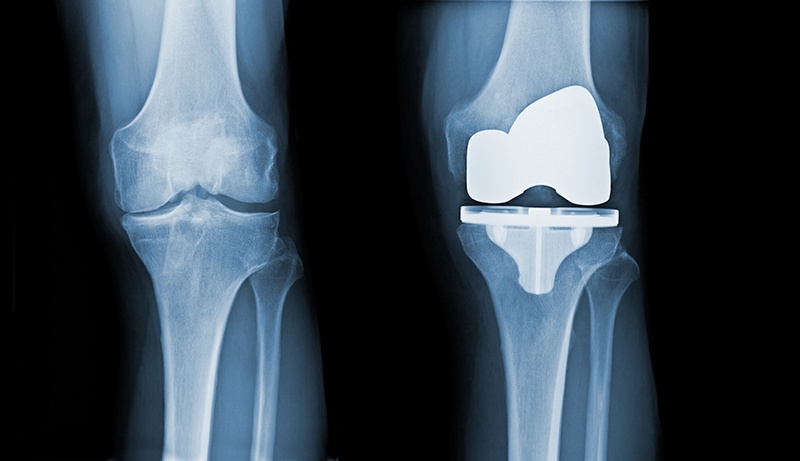
Everything You Need to Know about Total Knee Replacement (Arthroplasty)
Severe knee pain can be debilitating and disruptive to your everyday life. If therapy and medications have been unsuccessful in treating your knee pain, total knee replacement surgery may be your best option.
Severe knee pain can be debilitating and disruptive to your everyday life. If therapy and medications have been unsuccessful in treating your knee pain, total knee replacement surgery may be your best option.
Total knee replacement surgery, or knee arthroplasty, is the process of resurfacing the knee using plastic or metal pieces. This surgery aims to relieve knee pain by providing better support for damaged sections of the knee joint.
Total knee replacement may sound scary, but this surgery is routine and safe. In fact, surgeons performed more than 754,000 knee replacements in the U.S. during 2017, and this number continues to rise each year.
Knowing more about the total knee replacement process may help you feel more comfortable going into this surgery. Read on to learn everything you need to know about knee arthroplasty surgery.
What Is Total Knee Replacement?
The knee is the hinge joint that connects the upper and lower leg, allowing the leg to bend while you walk, run, sit, and lie down. Knees are the largest joints in the body, and maintaining a healthy, pain-free knee is essential to carrying out most day-to-day activities.
Healthy knees consist of three bones: the end of the femur, the end of the tibia, and the kneecap (patella). Each of these bones utilizes articular cartilage to protect its surfaces and create smooth movement within the joint. When atrophy or injury disrupts any of these surfaces, total knee replacement may become necessary.
Total knee replacement, or knee arthroplasty, consists of a surgical procedure that resurfaces the knee joint, relieving pain and repairing damaged surfaces. During this procedure, surgeons use artificial metal or plastic parts to cap the ends of the bones forming the knee joint and the kneecap.
The goal of total knee replacement surgery is to improve knee function, relieve pain, and uphold the quality of life for the patient.
Reasons to Undergo Total Knee Replacement
The most common reasons to undergo knee replacement surgery are to relieve pain from osteoarthritis and reconstruct damaged bones resulting from severe injury.
Several forms of arthritis can lead to knee injury, including:
- Osteoarthritis
- Rheumatoid arthritis
- Posttraumatic arthritis
Total knee replacement may also become necessary after severe fractures, torn cartilage, or torn ligaments resulting from accidents or other injuries.
Before recommending total knee replacement, doctors often try other medical treatments, such as medications, physical therapy, weight loss, and assistive devices, Additionally, because the knee replacement parts can wear down over time, many surgeons recommend postponing total replacement surgery as long as possible.
How to Prepare for a Total Knee Replacement
You and your doctor will decide together the best time to schedule your total knee replacement surgery. In the weeks before your surgery, you will need to sign a few consent forms, disclose your medical history and allergies to your doctor, and request time off work for your recovery.
You may also schedule a meeting with a physical therapist before the knee replacement surgery to discuss your rehabilitation and recovery schedule.
What to Expect for the Day of Your Surgery
On the day of your surgery, you should plan to fast for at least eight hours before your scheduled surgery time to ensure you do not have any adverse reactions to the anesthesia.
Once you arrive at the operating facility, a nurse will insert an IV into your arm or hand so that the anesthesiologist can administer anesthesia, which means you will not be awake during the surgery. While you are asleep, the surgeon will make an incision in the knee area, remove any damaged surfaces, and resurface the knee with plastic or metal parts. After resurfacing the knee, the surgeon will close the incision with stitches or surgical staples.
Recovery Period for Arthroplasty Surgeries
After your surgery, a nurse will take you to a recovery room to monitor your vitals as you wake up from the anesthesia. You will probably need to stay in the hospital for a few days, during which time a physical therapist will help you develop an exercise program and nurses will monitor your recovery and help manage your pain.
Once you return home, you will need to take it easy for several weeks, keep the surgery site clean, and watch for signs of infection. Complete recovery may take several months, but you will be able to return to your daily activities after about a month.
Contact Us Today
Total knee replacement may sound intimidating, but it may be a necessary step to help you return to your everyday life and begin completing the activities you love once again. If you are unsure whether total knee replacement is right for you, we recommend talking to Dr. Juan F. Agudelo at Orthopedic Center of Palm Beach County. Dr. Agudelo sees patients at three locations:
- Lake Worth Office
- Boynton Beach Office
- Wellington Office
At Orthopedic Center of Palm Beach County, we offer several areas of knee surgery expertise, including:
- Total knee replacement (arthroplasty)
- Knee arthroscopy
- ACL reconstruction
- Meniscal surgery and repair
- Knee cartilage restoration and transplantation
- PCL reconstruction
- Patellar and quadriceps tendon repair and reconstruction
- Medial patellofemoral (MPFL) / patellar instability reconstruction
- Knee ligament repair and reconstruction
Contact us today at 561-967-6500 to schedule a total knee replacement consultation with Dr. Juan F. Agudelo.





